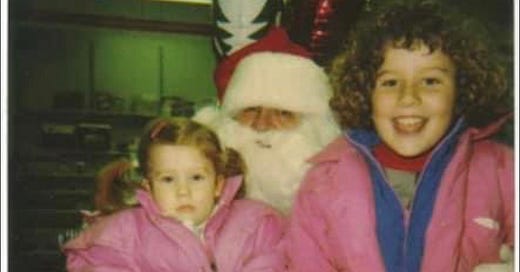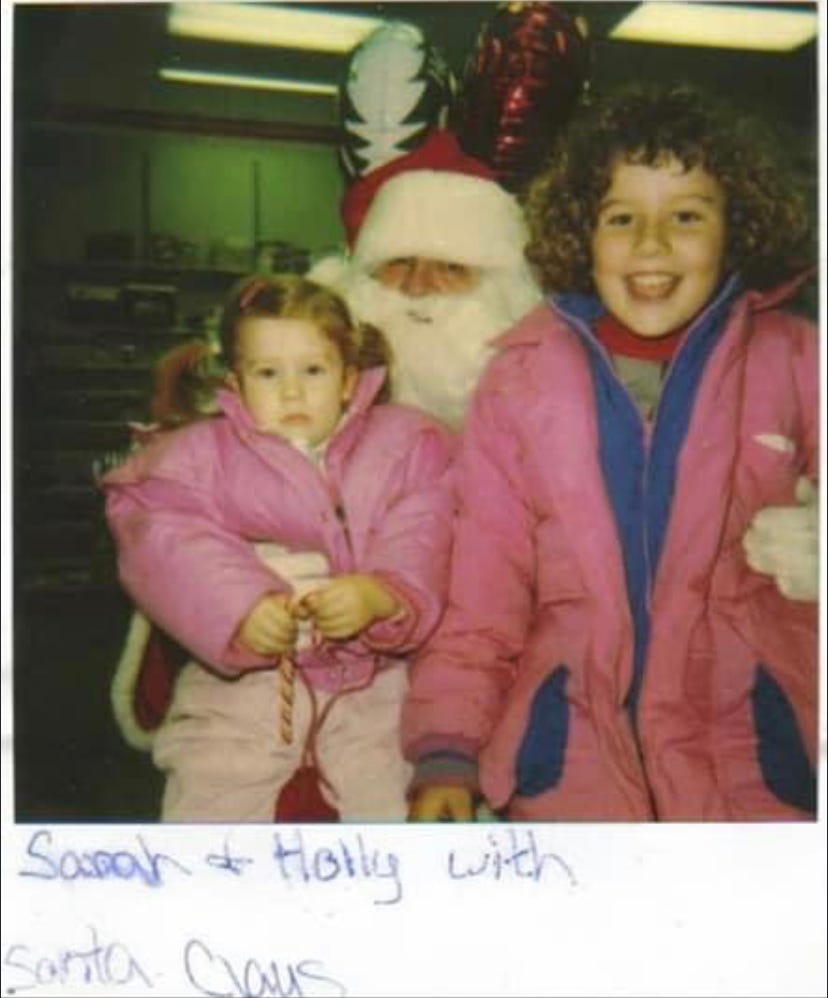Hi There Friend,
Welcome to Spirit: Notes for the Creative Contemplative, where I discuss the role of literature, creativity, and spirituality in culture through personal essays.
I’m so glad you’re reading, and if you landed here from the wilds of the internet, please subscribe.
Thanks for reading,
Sarah
“Mom, Papa touched Tooth again.”
Tooth is our Elf on the Shelf. My five-year-old son, Stanley, named him Tooth because just a few weeks ago the Tooth Fairy came for the first time. In Stanley’s mind, it makes sense that magical elves who are Santa’s spies and the fairies who take teeth in exchange for money are all cosmologically related.
“Tooth’s magic is going to go away,” Stanley said.
The problem with mythologies, I’m realizing is that there must be careful agreement to the ground rules, otherwise it crumbles, and my husband, Kent, had just broken one of the rules.
“You haven’t read The Elf on the Shelf: Christmas Tradition picture book for eight nights in a row and it shows,” I hiss at my husband when Stanley is out of earshot. The book clearly states that if a scout elf like Tooth is touched by a human being, he will lose his magic, so Kent fabricated a story about how Tooth asked him to boost him up on the kitchen windowsill so he could look out, and that as long as you have special permission from the elf himself, it’s fine. Every family I know with young children, who have found themselves embroiled in this Christmas phenomenon have a version of this story. My sister’s elf fell out of their Christmas tree and her kids burst into tears.
The Elf is supposed to travel to the North Pole every night to report their child’s behavior to Santa while the kid’s asleep, so it’s imperative that the Elf actually moves, every single night. One friend, kept forgetting, and had to lie to answer her daughter’s question: “Why hasn’t our elf moved in three days?”
We’ve all used the Elf to coerce good behavior.
“Tooth is watching you,” I reminded Stanley when he pitched a fit about picking up his toys. Or another time, I said, “Tooth heard that,” when Stanley talked back. The next day, as I was distracted, Stanley said, “Tooth is going to tell Santa that you’re not listening to me, Mom!” (Noted.)
Our family’s private mythologies evolve as we do, and we all have a role in storytelling. It’s the strange alchemy of our imaginations, our inside jokes, and the ongoing sagas of the imaginary and Divine beings we talk about that are rooted in our cultural traditions. In this way, we come into our beliefs about spiritual things, and it’s a process that will continue for the rest of our lives, as we gather more experiences, hear more stories, and develop spiritual practices.
Before Elf on the Shelf, we had the Shoe Ghost. Like most kids, Stanley has had an awful time of keeping track of his shoes whenever he takes them off. Any time my husband tripped over the shoes, he hid them. They appeared perched on the microwave, balanced on top of curtain rods, and nestled in with potted plants.
“How’d my shoes get there?”
“I don’t know,” I said.
“We have a Shoe Ghost,” Stanley said, and just like that, we had another imaginary being, a way for Stanley to rationalize my lie. Why did I lie? I suppose, I wanted to be in on the joke. Or I wanted to have some fun. This can backfire.
One rough morning three weeks ago, neither Stanley nor I could find his shoes.
“Help me look! We’re going to be late,” I screamed. We ran through the house turning over throw pillows, churning piles of laundry, and crouching to look under furniture in vain, as the clock ticked nearer to the tardy bell. Kent was already at work, but I called him.
“Where are Stanley’s shoes?”
“The Shoe Ghost left them behind the coffee pot.”
In the school drop-off line, I met Stanley’s eyes through the rearview mirror. “I’m sorry I yelled this morning when we couldn’t find your shoes.”
“Shoe Ghost used to be fun, now he’s frustrating,” Stanley replied, in a burst of sage-like wisdom.
He’s asked me if I am the shoe ghost, or if it’s Papa. We’ve tried to fess up.
“I’m the Shoe Ghost,” I admitted.
“No, you’re not.”
“Okay. Papa’s really Shoe Ghost.”
“No! He’s not.”
I am fascinated by my child’s innate, completely natural ability to believe in things he cannot see, to trust the stories we tell him and to sense the presence of spiritual beings. He is developing his beliefs through his direct observations of the world, and what is my role in this? Is it wrong to keep him hoodwinked?
My younger sister has always hated Santa Claus, and she didn’t want her kids to believe in Santa Claus, but peer pressure ultimately overpowered her decision. Her 6-year-old daughter came home from school heartbroken and asked, “Why do all my friends have elves? When will my elf come?” So now they have Dashy the Elf. At 8, my oldest niece now professes belief in Santa. “If it means she gets presents, then she’s all in,” my sister explained.
When I was growing up, some of the fundamental Christians I knew thought that it was sacrilegious to encourage belief in Santa. Jolly Saint Nick’s powers such as his ability to see when you’re sleeping and know when you’re awake (omniscience, basically), and swiftness to deliver toys to billions of kids in one night (omnipresence, basically) felt dangerously close to ascribing him Godlike attributes.
When I was Stanley’s age, I believed in Santa Claus, and I also believed that the Native American depicted on the cover of my Big Chief Paper Tablet (my first writing notebook) was a real person, who came to visit me at night. He was invisible, but I really perceived his presence, even if he was only in my imagination. To Stanley, the Shoe Ghost (his own invention) is real based on what he’s observed about what happens to his shoes at night.
I don’t think Santa Claus is spiritually dangerous. Nor do I think letting the Shoe Ghost myth continue or having the Tooth Fairy visit will ultimately damage Stanley, but it’s created an interesting microcosm of the way religion functions: to get rewards, to increase piety, and to give a sense of belonging). He will gradually sort out for himself what is real and what is not. What he believes and why. He’ll need to unlearn some things. Some things he will probably continue to believe even though they aren’t real, like how we believe in the truth of a fictional character in a novel.
Maybe the real lesson of Elf on the Shelf is this: Your behavior (good and bad) will be noticed. It’s not so much an panopticon threat of constant surveillance, as it is a reminder that to live in a family and a community means that your behavior effects those around you. It’s an important lesson about what it means to love and be considerate. At 5, Stanley can learn this from Tooth because it’s developmentally appropriate. We’re having a lot of fun with our Elf on the Shelf, and I know there’s only going to be this very brief window of time for Stanley when elves are still magical. After all, someone has to grab the Elf doll, and move him around each night, and that does, of course, take away a bit of the magic.







I like this: “it is a reminder that to live in a family and a community means that your behavior effects those around you.”